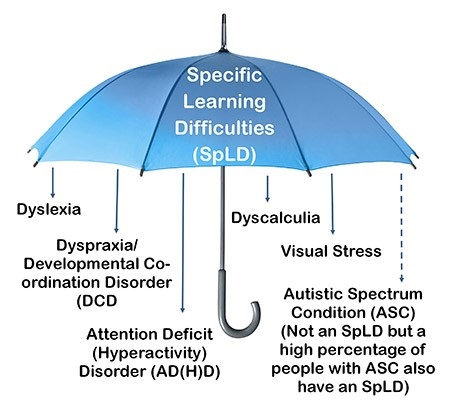- Accessibility
- My Sunderland
-
 Staff
Staff
-
 Students
Students
Save this page
Recently visited
You have yet to visit any pages
The following links below mark the 21 most recent pages you have visited in Sunderland.ac.uk.
Save this page
You have yet to visit any pages
Disability > Staff > SpLD Guidance
Specific Learning Difficulties (SpLDs) are neurological in origin and adversely impact the learning and processing of information. SpLD is an umbrella term which is used to refer to one or more of the following difficulties: - Dyslexia - Dyspraxia - Dyscalculia - Attention Deficit Hyperactivity Disorder (ADHD) - Autism Spectrum Disorder/Condition - Autism is not an SpLD, but a high percentage of Autistic students often also have an SpLD diagnosis.

An individual may have one of these conditions independently; alternatively, they can co-exist as part of a wider profile. SpLDs can also co-exist with difficulties on the autistic spectrum such as Asperger Syndrome.
There are a number of ways in which SpLDs can impact upon a student’s ability to study. However, the extent of the impact is contingent upon the length of time since diagnosis, existing coping strategies and mechanisms, and availability of support.
|
Study Factor |
Potential Difficulties |
|
Memory |
Sequencing information, organisation and planning, retention of information (dates, verbal instructions), absorbing information quickly from text |
|
Motor Control |
Handwriting legibility and speed, spatial awareness, |
|
Attention and Concentration |
Maintaining focus and focusing accurately for a sustained period |
|
Verbal expression and understanding |
Fluency of written composition, summarising from source material/paraphrasing, scanning and skimming information rapidly, writing concisely, planning, organising, ordering and structuring writing and ideas, sentence structure, grammar and punctuation. |
|
Time and Space |
Task and time management (planning and structuring time). |
Some students, many of whom have applied for Disabled Students Allowance, receive support from Specialist One to One Study Skills Tutors.
Tutors work with students on the following:
Tutors aim to deliver structured and tailored support for students to develop the necessary strategies to become independent learners.
An SpLD is a Specific Learning Difference/Difficulty, the most common of which are dyslexia, dyspraxia, dyscalculia and Attention Deficit Disorder:
|
Dyslexia is typically characterised by difficulties with writing, reading and spelling. This could involve getting letters the wrong way round e.g. mistaking b for d, having difficulty transferring thoughts onto the page, and having working memory difficulties. |
|
Dyscalculia is typically characterised by having difficulties with numbers such as problems with basic arithmetic, experiencing significant levels of anxiety when faced with a numerical problem and difficulties with estimating cost. |
|
Dyspraxia is typically characterised by fine and gross motor coordination difficulties. This could involve having difficulty with writing, catching a ball, performing delicate precision practical tasks, as well as organisational difficulties. |
|
Attention Deficit (Hyperactivity) Disorder is typically characterised by impulsive behaviour, difficulty concentrating for prolonged periods of time and in some cases, hyperactivity. Some of the difficulties people with AD(H)D experience include difficulties with absorbing information, maintaining interest in a set task for a prolonged period, turn taking, impulsiveness and difficulties with sitting still. |
|
|
|
|
|
|
|
|
|
|
|
|
|
|
|
|
|
|
|
This is just a brief overview of some of the difficulties a student with an SpLD may experience. There isn’t a one size fits all approach to supporting students with an SpLD, what works for one, may not work for another, but the suggestions above are some of the most common strategies that many students find useful.
1st Floor, Edinburgh Building,
City Campus, Chester Road,
Sunderland, SR1 3SD
Telephone: +44 (0)191 515 2952
